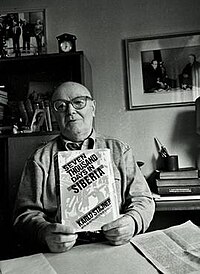Karlo Štajner
| Karlo Štajner | |
|---|---|

Štajner with his book Seven Thousand Days in Siberia, 1988
|
|
| Born |
Karl Steiner 15 January 1902 Vienna, Austria-Hungary |
| Died | 1 March 1992 (aged 90) Zagreb, Croatia |
| Citizenship | Yugoslavian |
| Occupation | printing worker, politician, author |
| Known for | surviving 20 years in the Gulag |
| Notable work | "Seven Thousand Days in Siberia" |
| Political party | |
| Spouse(s) | Sonya Štajner |
Karlo Štajner (15 January 1902 – 1 March 1992) was a Yugoslavian communist activist and author of Austrian origin and a prominent Gulag survivor. Štajner was born in Vienna, where he joined the Communist Youth of Austria, but emigrated to the Kingdom of Serbs, Croats and Slovenes in 1922 on the order of the Young Communist International to help the newly established Communist Party of Yugoslavia. After an illegal communist printing house in Zagreb where Štajner worked was searched by the police in 1931, he fled Yugoslavia, visiting Paris, Vienna, and Berlin before finally settling in the Soviet Union in 1932 where he worked in the Comintern publishing house in Moscow. During the Great Purge in 1936, Štajner was arrested and spent the next 17 years in prisons and gulags and three more years in exile in Siberia. He was released in 1956 after being rehabilitated, and returned to Yugoslavia. He spent the rest of his life in Zagreb with his wife Sonya whom he married in Moscow in the 1930s.
In 1971, Štajner published a book titled "Seven Thousand Days in Siberia" about his experiences. The book was a bestseller in Yugoslavia and was named the "book of the year 1972" by the Vjesnik newspaper.
Štajner was born Karl Steiner in Vienna, Austria-Hungary on 15 January 1902. He worked as printing worker when he joined the communist movement in the First Austrian Republic in 1919. He became a member of the Communist Youth of Austria and later became a member of the organization's Central Committee. The Communist Party of Yugoslavia (CPY) was banned in December 1920 and all communist activities were prohibited by the regime of Alexander I of Yugoslavia. In December 1921, Štajner was sent to the Kingdom of Serbs, Croats and Slovenes by the Young Communist International to help the CPY. From January 1922 until 1931, he lived in Zagreb, where he ran an illegal communist printing house, and was helping local CPY cell. During this time, he became a citizen of the Kingdom of Yugoslavia.
...
Wikipedia
